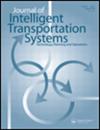用于估算匝道和非匝道交通流量的数据驱动迁移学习框架
IF 2.8
3区 工程技术
Q3 TRANSPORTATION
Journal of Intelligent Transportation Systems
Pub Date : 2025-01-02
DOI:10.1080/15472450.2023.2301696
引用次数: 0
摘要
为了制定最合适的控制策略,监测、维护和评估高速公路交织区的交通性能,各州和地方交通部门需要...本文章由计算机程序翻译,如有差异,请以英文原文为准。
Data-driven transfer learning framework for estimating on-ramp and off-ramp traffic flows
To develop the most appropriate control strategy and monitor, maintain, and evaluate the traffic performance of the freeway weaving areas, state and local Departments of Transportation need to have access to traffic flows at each pair of on-ramp and off-ramp. However, ramp flows are not always readily available to transportation agencies, and little effort has been made to estimate these missing traffic flows in locations where no physical sensors are installed. To bridge this research gap, a data-driven framework is proposed that can accurately estimate the missing ramp flows by solely using data collected from loop detectors on freeway mainlines. The proposed framework employs a transfer learning model. The transfer learning model relaxes the assumption that the underlying data distributions of the source and target domains must be the same. Therefore, the proposed framework can guarantee high-accuracy estimation of on-ramp and off-ramp flows on freeways with different traffic patterns, distributions, and characteristics. Based on the experimental results, the flow estimation mean absolute errors range between 23.90 veh/h to 40.85 veh/h for on-ramps and 31.58 veh/h to 45.31 veh/h for off-ramps; the flow estimation root mean square errors range between 34.55 veh/h to 57.77 veh/h for on-ramps, and 41.75 veh/h to 58.80 veh/h for off-ramps. Further, the comparison analysis shows that the proposed framework outperforms other conventional machine learning models. The estimated ramp flows based on the proposed method can help transportation agencies to enhance the operations of their ramp control strategies for locations where physical sensors are not installed.
求助全文
通过发布文献求助,成功后即可免费获取论文全文。
去求助
来源期刊
CiteScore
8.80
自引率
19.40%
发文量
51
审稿时长
15 months
期刊介绍:
The Journal of Intelligent Transportation Systems is devoted to scholarly research on the development, planning, management, operation and evaluation of intelligent transportation systems. Intelligent transportation systems are innovative solutions that address contemporary transportation problems. They are characterized by information, dynamic feedback and automation that allow people and goods to move efficiently. They encompass the full scope of information technologies used in transportation, including control, computation and communication, as well as the algorithms, databases, models and human interfaces. The emergence of these technologies as a new pathway for transportation is relatively new.
The Journal of Intelligent Transportation Systems is especially interested in research that leads to improved planning and operation of the transportation system through the application of new technologies. The journal is particularly interested in research that adds to the scientific understanding of the impacts that intelligent transportation systems can have on accessibility, congestion, pollution, safety, security, noise, and energy and resource consumption.
The journal is inter-disciplinary, and accepts work from fields of engineering, economics, planning, policy, business and management, as well as any other disciplines that contribute to the scientific understanding of intelligent transportation systems. The journal is also multi-modal, and accepts work on intelligent transportation for all forms of ground, air and water transportation. Example topics include the role of information systems in transportation, traffic flow and control, vehicle control, routing and scheduling, traveler response to dynamic information, planning for ITS innovations, evaluations of ITS field operational tests, ITS deployment experiences, automated highway systems, vehicle control systems, diffusion of ITS, and tools/software for analysis of ITS.

 求助内容:
求助内容: 应助结果提醒方式:
应助结果提醒方式:


